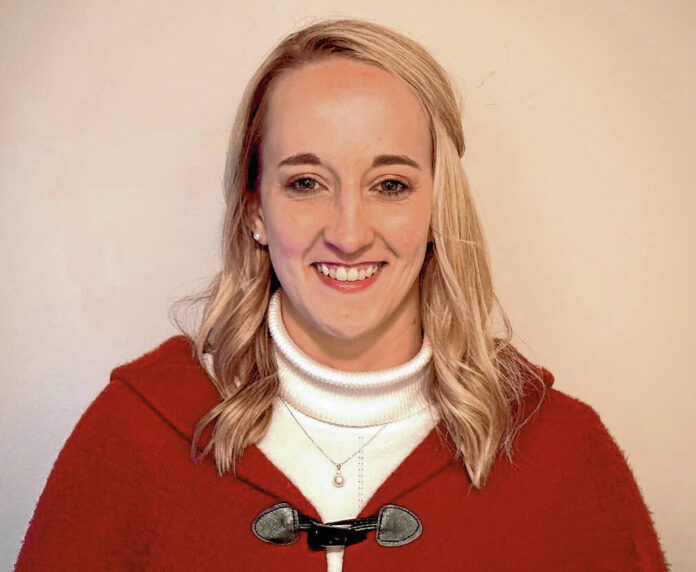HANCOCK COUNTY – The leader of a team that will carry out mobile responses to mental health needs throughout the county has a background in social work and says she’s driven by a passion for change.
Emily Divine is the manager of the Hancock County mobile response team that Community Fairbanks Behavioral Health is forming. The county committed nearly $2.1 million toward the initiative last year from funds it received from the American Rescue Plan. Efforts on envisioning the mobile response team and overcoming other mental health barriers in Hancock County started about two years ago among Community Fairbanks, Healthy365 and the justice system.
Divine has a bachelor’s degree in education and began her career teaching before transitioning to social work. She has worked for the Indiana Department of Child Services in Hancock County and in social work in the education sector in Indianapolis, specifically at early childhood centers. Most recently, she interned at Healthy365, Hancock Health’s community health arm.
“I’m really passionate about change, and I’m a helper, so I like to relieve burdens and pain from individuals that I work with,” Divine said. “And when I was a teacher, I saw some children who were suffering at home and I couldn’t help them because my role was just in the school, so I really wanted to find a career that let me make more of an impact in their homes and with their extended families.”
She found a passion for work at a macro level while at the Department of Child Services, she continued.
“I like to see systems working properly,” she said, adding she went on to earn a master of social work degree before starting at Healthy365.
Hancock County has a void when it comes to immediate services for mental health and substance abuse, Divine said. She recalled that when being called out to situations with the department of child services, there was often discussion between the department and law enforcement about how to help people in the middle of the night and needing to transport them to Indianapolis for many needs.
“I’d like to see Hancock County have its own system in place here to where we’re not having to send residents from Hancock County outside of Hancock County to get the treatment that they need,” Divine said. “Especially with this population – they don’t always have the means to travel on their own, and so when we’re no longer involved with them, how are they going to keep getting help? I’d like to see, down the road, programs developed outside of even the mobile response team, that this encourages other organizations to do some more things so that we have more of a network to partner with.”

Tondra Crum-Worley, program manager for Community Fairbanks Behavioral Health Hancock Outpatient, said the mobile response team will start out with four other staff members. Two will be life skills clinicians – bachelor degree-level individuals trained in some form of behavioral health.
The other two will be certified peer recovery specialists, who meet with those with addiction issues in the hopes of getting them involved in a treatment program. Community Fairbanks currently employs those in that profession in the emergency department at its Community East location in Indianapolis.
The team will have shifts made up of a life skills clinician and a certified peer recovery specialist working from 10 a.m. to 8 p.m. seven days a week, and the goal is to get more funding to grow into a 24/7 operation.
Openings have been posted for the positions and Crum-Worley hopes to have the team assembled and working within a month and a half to two months. Plans are to start slow, she continued, and open it up to those from Hancock County visiting certain places, like Community Hospital North’s crisis department and Community Hospital East’s emergency department.
Crum-Worley said after the team is fully up and running, the goal is to have a dedicated phone number that can be referred to when the team is needed. Initially, the team will respond to calls within 48 hours, she continued, adding the long-term goal is to reduce that to one hour.
When a person in need of the team is called, a safety screen will be conducted to ensure it’s safe for the team to respond. The team will respond to wherever the individual is comfortable meeting, whether it’s their home, their job or out in public.
“The goal is for them to be able to de-escalate whatever that crisis situation is,” Crum-Worley said. “So if they are meeting some of the social determinants that really make living hard – they’re having housing issues, they don’t have food, they don’t have a job, they’re in active addiction, they need to get into a detox center – any of those things that we can then help bridge and connect them to all of those things that they need.”
Community Fairbanks Behavioral Health also wants to help people the team responds to in need of behavioral health get treatment for that quicker, Crum-Worley said. When people get the help they need, she added, it will cut down on emergency room visits, arrests and 911 calls that first responders may not be able to handle, ultimately reducing expenses to people, hospitals and government.
The mobile response approach is not novel, Crum-Worley said, noting Arizona has had crisis systems for decades. She also pointed to a team that started in Columbus, Indiana late last year.
“You’re going to be seeing more mobile response teams – more crisis response type things, initiatives – coming out from a federal, a state and local level,” she said. “Behavioral health is really moving in this direction, so people can get into services quicker, and try to cut down some of those barriers.”





